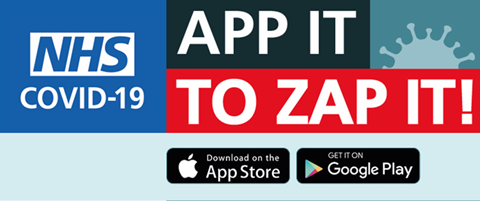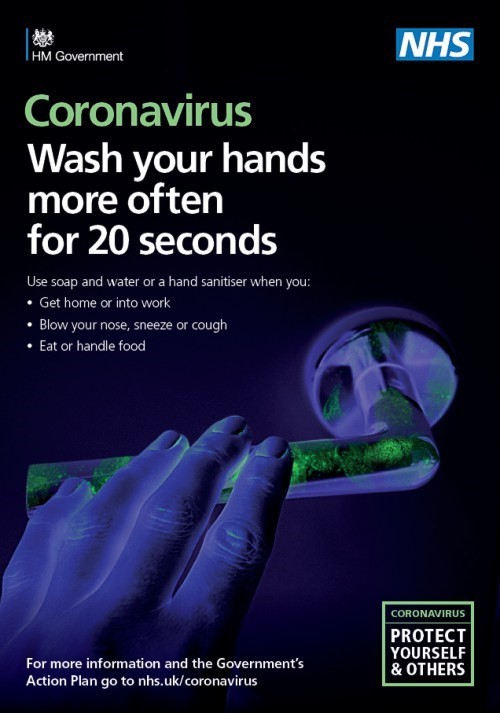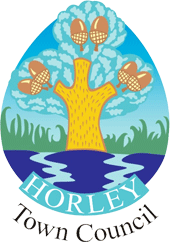Coronavirus - Latest Information and Advice
Can I leave my home during lockdown?
You must not leave, or be outside of your home except where necessary. You may leave the home to:
- shop for basic necessities, for you or a vulnerable person
- go to work, or provide voluntary or charitable services, if you cannot reasonably do so from home
- exercise with your household (or support bubble) or one other person (in which case you should stay 2m apart). Exercise should be limited to once per day, and you should not travel outside your local area.
- meet your support bubble or childcare bubble where necessary, but only if you are legally permitted to form one
- seek medical assistance or avoid injury, illness or risk of harm (including domestic abuse)
- attend education or childcare - for those eligible
If you do leave home for a permitted reason, you should always stay local - unless it is necessary to go further, for example to go to work. Stay local means stay in the village, town, or part of the city where you live.
If you are clinically extremely vulnerable you are advised to only go out for medical appointments, exercise or if it is essential. It is recommended that you do not attend work.
You can read a more detailed breakdown of the lockdown rules on the Government's Website.

The NHS COVID 19 app is the next step in the fight to stop the spread of Coronavirus in Surrey. With multiple functions and using the privacy preserving technology, the app is the fastest way to see if you are at risk from Coronavirus. The quicker you know, the faster you can protect yourself, your loved ones and others. The more Surrey residents that download the app, the longer we can continue to keep Surrey safe.
What does the app do?
- Sends you an alert when you are at risk of infection.
- Alerts you when the levels of Coronavirus are rising in your area.
- The built in QR codes makes checking into bars and restaurants super easy, and you will be alerted if you've been near someone with the virus.
- It’s the best way to avoid a local lockdown and keep the virus under control.
- It helps you check your symptoms and book a test.
- Explains how to isolate and helps you keep track of the number days if you have to.
- Remember it tracks the virus – not you.
- The ‘check-in’ feature provides users with a digital diary and can send you alerts if you have visited a venue where you may have come into contact with Coronavirus.
- The app remembers who you’ve met, including people you don’t know, so you don’t have to – that includes on the bus or in a shop queue.
Privacy and personal data
It’s important to remember that the app tracks the virus – not you, which means all your personal data and information is always safe and protected. Any data shared on the app is held on your phone and the app doesn’t use GPS so nobody will know who or where you are.
Some need to know info
To download and use the app you must:-
- Be aged 16 or over.
- Live in England or Wales.
- Have a compatible iOS or Android smartphone with Bluetooth.
Checking in using QR codes
Certain types of businesses will have a legal requirement to display a QR poster, ready for customers to scan using the App from 24 September.
Types of venues who will be legally obliged to display a QR poster are:-
- Hospitality – bars, restaurants, hotels, cafes
- Tourism and Leisure – museums, galleries, gyms, leisure centres
- Local authority buildings
- Places of worship
- Close contact services
- Where an event is taking place in a physical location
Look out for an NHS QR code poster when you enter these places so you can easily check-in using the app.
Love your local area
Lockdown was difficult for many people and we should all do what we can to prevent it. Let’s not only protect ourselves and our loved ones but also where we live so we can stop the spread of Coronavirus in our local areas.
Depending on your mobile device, visit the App Store or Google Play Store and search NHS COVID 19 app to download. For more information watch the NHS video or visit the NHS COVID 19 Test and Trace app webpage.
Coronavirus (Covid-19) - Information and Advice
September 2020

Coronaviruses can be spread when people with the virus have close, sustained contact with people who are not infected. This typically means spending more than 15 minutes within two metres of an infected person, such as talking to someone for instance.
The more you come into contact with the droplets from coughs and sneezes of an infected person, the more likely you are to catch the infection. This is why we ask people who have the infection to self-isolate at home and not to go out and about where they can pass it on.
Staying Safe Outside your Home
The Government has published the following advice on how to stay safe when outside your home:
1. Keep your distance from people outside your household or support bubble;
2. Avoid being face-to-face with people if they are outside your household or support bubble;
3. Keep your hands and face as clean as possible;
4. Keep indoor places well ventilated;
5. Avoid crowded spaces;
6. Work from home if you can;
7. If you have to travel (for example, to work or school), think about how and when you travel. Walk or cycle wherever possible and avoid peak times if using public transport;
8. Face coverings: You must wear a face covering at all times on public transport or when attending a hospital as a visitor or outpatient. Hospitals will be able to provide a face covering in emergencies. Face masks will also be compulsory in shops and supermarkets from July 24. Anyone who fails to adhere to the new rules will face a £100 fine;
9. Avoid shouting or singing close to people outside your household or support bubble;
10. Reduce the number of people you spend time with in a work setting;
11. Wash your clothes regularly; and
12. When at work or in business or public premises, follow the advice on site.
For further details about how to stay safe outside your home, please see the Government’s advice on Gov.uk.
What should I do if I think I have the virus?
The most important symptoms of coronavirus (COVID-19) are recent onset of any of the following:
- a new continuous cough;
- a high temperature; and
- a loss of, or change in, your normal sense of taste or smell (anosmia).
If you have symptoms of coronavirus (COVID-19), however mild, OR you have received a positive coronavirus (COVID-19) test result, the clear medical advice is to immediately self-isolate at home for at least 7 days from when your symptoms started. Do not go to a GP surgery, pharmacy, or hospital. You should arrange to have a test to see if you have COVID-19 which can be arranged here.
Consider alerting people who you do not live with and have had close contact within the last 48 hours to let them know you have symptoms of coronavirus COVID-19.
After 7 days, or longer, if you still have symptoms other than cough or loss of sense of smell/taste, you must continue to self-isolate until you feel better.
Staying at home for 14 days will greatly reduce the overall amount of infection that people in your household could pass on to others in the community.
The Government has published more comprehensive advice about what to do if you think you’ve have caught the virus which is well worth reading.
Scam Protection Advice
There are increasing reports of criminals using concerns around Coronavirus to scam people, for example by knocking on doors to offer to purchase shopping or gaining access to properties or by claiming to be performing a deep-clean.
If you hear of anyone being scammed or threatened please encourage them to report it to Action Fraud. It is important that the Police are made aware so they can build accurate data around areas where scammers are operating.
Volunteering
Anyone who wishes to volunteer in response to the Covid-19 outbreak can register with Voluntary Action Reigate & Banstead (VARB).
Any organisation providing support in response to the Covid-19 outbreak should provide their details. These will be used to map services and ensure they receive updated information and support.
Advice and support for business owners
Employers that want to reopen their business have a legal responsibility to protect their employees and other people on site. To help identify what actions you or your workplace should take the Government has created an online questionnaire. This only takes a minute to fill in and will direct you to the most useful and up-to-date guidance.
The Government has recently launched the Recovery Advice for Business scheme, supported by the government and hosted on the Enterprise Nation website, which will give small firms access to free, one-to-one advice with an expert adviser to help them through the coronavirus pandemic and to prepare for long-term recovery. To access this platform visit Enterprise Nation here.
If your business provides accommodation, or you work for an accommodation provider, the Government has published specific advice that affects you industry. Read the Government’s advice for accommodation providers here.
Reigate and Banstead Borough Council is also providing a range of useful support to local business owners, which can be found on their website.
Surrey County Council
Surrey County Council’s Covid-19 Information page
Surrey County Council’s Community and Welfare guidance
Reigate and Banstead Borough Council
RBBC’s Information and Advice page
RBBC’s Interactive Map of Services and Support Directory
Public Information – Useful Links
The latest Government Information and Advice
Public Health England’s advice for Mental Wellbeing during the pandemic
The Government’s Coronavirus Action Plan
Government Advice for Businesses
Stay up-to-date with the government information as it comes out with the Government’s Covid-19 Alerts.
Gatwick Airport Passenger Information
Guidance for Better Mental Health, Rehab4Addiction
The Benefits Of Running, Moccasin Guru



